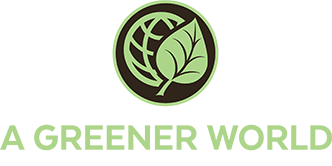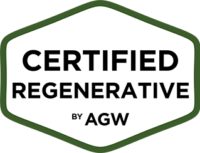Regenerative farming goes beyond sustainability to restore ecological balance. With a core focus on soil, regenerative agriculture promotes continual improvement and healthy, thriving ecosystems.
Certified Regenerative is a hard-earned badge of difference demonstrating a commitment to the environment and local communities. Certified Regenerative farms maximise soil health, while mitigating the negative impacts of humans and livestock. This includes the positive management and regeneration of soil, water, air, cropping systems, livestock, biodiversity, wild harvested resources, and people.
A central premise of the Certified Regenerative standards is that animals must be allowed to behave naturally and can play an important role in the nutrient cycling when raised in animal-centred farming systems.
A key part of Certified Regenerative by AGW is the Regenerative Plan. This plan, designed with support from a qualified expert, is how A Greener World assesses compliance with the Certified Regenerative standards and the farm’s own goals.
While we recognise the competency of many farmers to write their own Regenerative Plan, you may also benefit from the services of a Qualified Expert to help you develop your plan, or for specific areas that you don’t feel comfortable with – for example, bringing in an expert to do a bird count or for soil health advice.
A Qualified Expert can be an organisation or professional individual recognised as specialists in their field. Annex A of the Certified Regenerative standards covers our requirements for a Qualified Expert. For more information, contact regenerative@agreenerworld.org.
The Certified Regenerative standards have been carefully researched, developed and reviewed by the Certified Regenerative Standards Board, with the advice of experts from an extensive network of pioneering veterinarians, scientists and farmers committed to regenerative systems. The standards have also been road-tested through AGW’s pilot program with feedback from farmers and the public. AGW believes that there is always room for improvement, and our standards are evaluated annually to incorporate the latest research and best practices in regenerative agriculture.
Certified Regenerative by AGW standards are available here. If you are interested in obtaining a copy of the standards or participating in the pilot, please email regenerative@agreenerworld.org.
Certified Regenerative is a “whole farm” programme, meaning that all products produced on the farm – including plant- or animal-based products – must be produced according to the Certified Regenerative standards. If a farm is granted Certified Regenerative status, all its products can bear the Certified Regenerative logo (assuming all animal products are Certified Animal Welfare Approved by A Greener World). A certified holding can also carry no products for market.
There are numerous differences and overlaps between Certified Regenerative and organic certification, but the core difference is that Certified Regenerative is focused on regeneration and improving land and the ecosystem; whereas, organic certification is focused on excluding toxic chemical pesticides and fertilisers in production.
While people often assume organic principles are ‘regenerative’, organic standards do not actually require the benchmarking of things like soil health, water or air quality, or wildlife species/habitats, social fairness, nor measurement over time to ascertain improvements (or otherwise). A farm can apply both organic and regenerative approaches simultaneously and maintain both certifications. Indeed, Certified Regenerative by AGW complements — and arguably enhances — any existing organic certification.
Existing international standards were consulted in forming a strict group of inputs allowed and prohibited under the Certified Regenerative programme. See Annex D of the Certified Regenerative standards for the List of Prohibited Inputs, as well as Annex E, for the List of Allowed Inputs.
Yes. The type of farming system is far more important than its scale, and AGW already certifies a number of very large sustainable, high-welfare farming systems across the world. Certified Regenerative farms may be any scale as long as the standards are achieved and maintained.
Unlike organic certification, there is no conversion period to gain Certified Regenerative status. On the first year of certification, however, the farm history and risks are reviewed. If there is a risk of toxic pesticide or other chemical residues, for example, the farm will have to enact a plan of remediation before products can reach the market.
Although there is no single standard that is considered entirely equivalent, AGW may offer simplified audit forms (checklists) for some certifications, reducing the need for Certified Regenerative audit for those applicable section requirements. See Annex F of the Certified Regenerative Standards for Recognition/Equivalencies with other Certifications.
Please find complete information about fees on our Fee Schedule page. AGW also offers a number of free services including technical and marketing support. We invite you to reach out to our Farmer and Market Outreach Coordinators to take advantage of these complimentary services and look forward to working with you to make the most of your high-value, market-leading certification.
The individual or entity seeking Certified Regenerative status must have management control of the farm or holding. Cooperatives and networks of independent farms are also eligible, with the understanding that all farms in a group must be certified if the group wants to claim Certified Regenerative status.
Additionally, if the farm raises animals for meat, dairy or other agricultural production, the individual or entity seeking Certified Regenerative status must adhere to Certified Regenerative livestock standards and at least one species on the farm must be certified to Certified Animal Welfare Approved by AGW standards within one year of becoming Certified Regenerative, with a plan for all applicable species to be certified within five years.
No. The use the Certified Regenerative logo is not allowed without a successful audit of the holding and compliance with applicable policies and procedures.
All farms are audited/inspected at least annually to ensure compliance. Audits are impartial and based on the published standards. Though an audit is a snapshot of a farm, auditors can get an accurate picture of year-round practices by evaluating farm records, environmental quality and animal conditions. Annual testing of soil and high-risk factors from the Regenerative Plan will also be required.
Certified Regenerative is the only regenerative certification that functions as an immediate and ongoing partnership in regeneration, facilitating mainstream market access and widespread impact. As Certified Regenerative requires Certified Animal Welfare Approved by AGW certification for animals, this is an additional selling point for restaurants, retailers and other market-savvy buyers.
Those who gain or seek Certified Regenerative status will also have access to AGW’s valuable support services, including:
- AGW’s marketing team that works to support farmers in accessing markets, branding and adding value to their product with the Certified Regenerative by AGW logo.
- Listing in the AGW online directory, frequented by thousands of consumers seeking sustainable, high-welfare meat, dairy, eggs, cereals and other products.
- AGW’s expert technical staff, available to support environmentally sustainable, practical and profitable regenerative and pasture-based production.
With so much negativity around food and farming today, A Greener World also serves as a beacon of positive change. We exist to promote and support real-life farming models to the public and offer practical guidance on achieving truly sustainable livestock farming systems to farmers.
Established in 2014, our evolving mission has four key components:
- To identify and promote agricultural systems that have a positive impact on the environment, society and animals (wild and farmed)
- To educate consumers about the environmental, social and animal outcomes of their food purchasing decisions
- To establish and promote trusted farm certification programmes that help reconnect the consumer and food producer by encouraging—and rewarding—positive farm management changes
- To support independent farmers who are committed to sustainable livestock production
Certified Regenerative is the only third-party certification system that truly measures change by meeting a farmer where they are and partnering with them on a journey of regeneration. It is the only regenerative agriculture programme that audits in conjunction with the regenerative plan, thereby ensuring site-specific, measurable progress. Certified Regenerative also stands alone in measuring change through soil, water and air, while also requiring regenerative practices in biodiversity, buildings, animal health and welfare, and assurances of the protection of key International Labour Organisation (ILO) principles of social responsibility.
Certified Regenerative does not require organic certification (though it can be done together), which enables a more diverse set of farmers and landholders to participate in the regenerative journey. Also, Certified Regenerative offers detailed criteria and principles that cover regeneration in a comprehensive manner, while also requiring testing to reflect risk of human or livestock activities.
Importantly, Certified Regenerative is not outcome-based, as many standards are today; rather, Certified Regenerative is a tool itself, used for measuring and managing the process of regeneration with continual improvement expectations until a state of ecological equilibrium is reached.
Great! We will be opening the program to accept new applications this summer. To find out more, please get in touch at info@agreenerworld.org.za.

